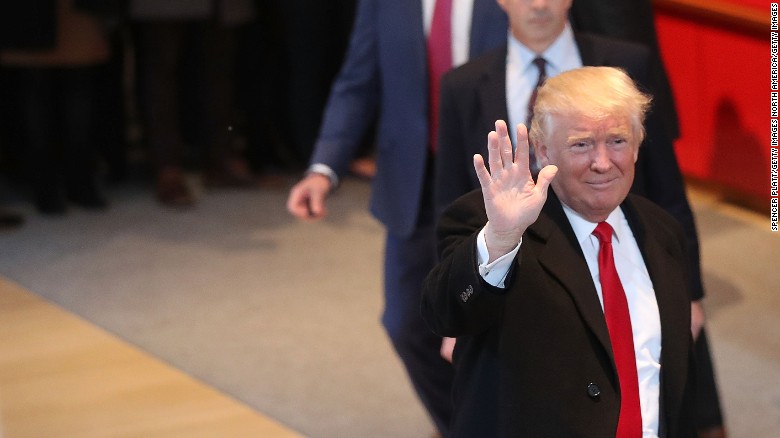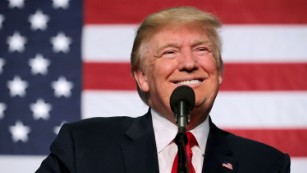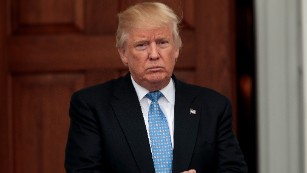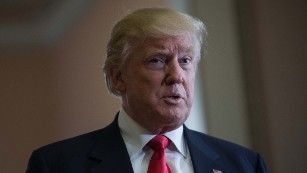6 takeaways from Donald Trump's New York Times meeting
President-elect Donald Trump brushed aside his campaign promises to jail Hillary Clinton, batted away questions about conflicts of interest over his business empire and denounced the neo-Nazi movement that is celebrating his victory.
Answering questions for just the second time since his election, Trump met for 75 minutes on Tuesday with reporters, editors and columnists from The New York Times.
Sponsor Content
Autos on the Rise: Cars and trucks are no longer just being assembled in India - they're being manufactured here.
India is now one of the world's largest auto manufacturers, with foreign carmakers investingheavily in the sector. Find out why India's auto's industry is booming.
Content provided by MAKE IN INDIA
It wasn't broadcast live, but some Times reporters tweeted Trump's remarks in real time. And, since Trump has not held a news conference since his upset win two weeks ago, the entire political world was glued to Twitter through it all.
Here are six takeaways from Trump's meeting with the Times:
The grudges Trump is still holding
The President-elect was downright magnanimous toward his longtime Democratic foes.
About his campaign promise to jail Hillary Clinton, Trump said he doesn't want to "hurt the Clintons" and that doing so would be "very, very divisive for the country."
He heaped praise on President Barack Obama, saying he appreciated Obama's handling of the transition of power and liked him personally. "I didn't know if I'd like him. I probably thought that maybe I wouldn't, but I did. I really enjoyed him a lot," Trump said.
And of New York's Chuck Schumer, the new Senate Democratic leader: "I've liked Chuck Schumer for a long time."
So it's not the opposition that still gets under Trump's skin.
It's his fellow Republicans -- particularly those who ran away from him in the general election.
Donald Trump's first 100 days: A breakdown of his plan
Trump bragged that he "helped numerous senators" win, and took a shot New Hampshire Sen. Kelly Ayotte, a Republican who narrowly lost after distancing herself from Trump. "No, thank you," he said he told Ayotte about a post in Trump's Cabinet.
He also mocked Nevada Rep. Joe Heck, a Republican who lost his Senate race after similarly staying far away from Trump. Heck, he said, fell "like a lead balloon."
Trump was also cautious about the Republican congressional leaders -- House Speaker Paul Ryan and Senate Majority Leader Mitch McConnell.
"Right now they're in love with me," Trump said. "Four weeks ago, they weren't in love with me."
A Nixonian conflict-of-interest view
Trump brushed aside questions about how his actions in the White House could benefit his businesses with a startling declaration.
"The law's totally on my side. The president can't have a conflict of interest," Trump said.
It was reminiscent of Richard Nixon's comment to journalist David Frost that by definition, a president's actions don't violate the law. "Well, when the president does it, that means it is not illegal," Nixon said.
Trump acknowledged his businesses will benefit from his victory, saying his new hotel in Washington is "probably a more valuable asset than it was before" and that its brand is "hotter."
But he said he's no longer interested in his businesses and will be passing them on to his children.
"I don't care about having anything to do" with anything outside the United States' best interests, he said. "I don't want to influence anything."
A new view on climate change?
On the campaign trail, Trump had pledged to withdraw the United States from the Paris climate accords -- a move that would upend global efforts to address global warming.
Tuesday, he wasn't as specific.
"I'm looking at it very closely. I have an open mind to it," he said.
Trump admits humans have 'some connectivity' on climate change
It was part of a broader change for the President-elect on the topic of climate science. He had previously rejected scientists' conclusion that humans have played a role in the earth's warming. But on Tuesday, Trump said that "I think there is some connectivity" between humans and climate change, although he declined to elaborate.
Trump's white supremacist disavowal
Days after the white supremacist movement, known as the "alt-right," gathered in Washington to celebrate Trump's victory, the President-elect said he wants nothing to do with them.
"I don't want to energize the group, and I disavow the group," he told the Times. "It's not a group I want to energize, and if they are energized, I want to look into it and find out why."
Also notable is what Trump didn't do: He didn't condemn the white supremacist groups like the National Policy Institute, which led the weekend gathering, by name -- something that's noticed every time Trump personally takes the time to slam the cast of "Hamilton" or wade into other feuds on his Twitter account.
Donald Trump disavows 'alt-right'
Trump also took flak recently after he tapped his campaign CEO Steve Bannon to be one of his top two advisers in the White House. Bannon, the former executive chairman of Breitbart News, touted the website as "the platform for the alt-right." Bannon rejected the anti-Semitic and racist elements of the alt-right in an interview with the Wall Street Journal this week and declared himself an "economic nationalist."
Trump defended Bannon in his New York Times meeting, saying that he's known him for "a long time" and that the allegations of anti-Semitism and connections to the alt-right are "not him."
"If I thought he was racist, or 'alt-right' ... I wouldn't even think about hiring him," Trump said Tuesday.
Kushner the peace-maker?
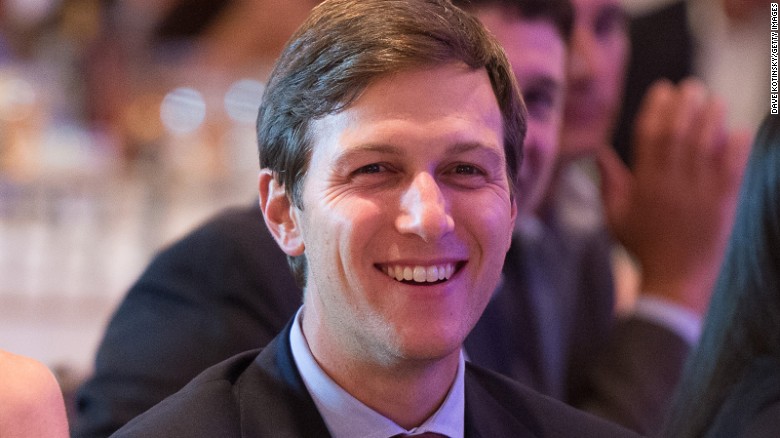
How Jared Kushner led Trump to victory
Trump laid out some lofty foreign policy ambitions.
"I would love to be the one who made peace with Israel and the Palestinians. That would be such a great achievement," he said, referring to a conflict that has vexed presidents for decades.
How is Trump going to do that?
It's not clear -- and Trump showed just how limited his foreign policy knowledge is when he suggested his son-in-law, Jared Kushner, could help make peace between the Israelis and Palestinians.
Trump's approach to foreign policy remains an open question. He did tell the Times, "I don't think we should be a nation-builder" -- an implicit shot at the American military's role in the Iraq War.
He also said "we have to end that craziness that's going on in Syria," adding that he has a "different view than everybody else" of that conflict -- without explaining that view.
What an age we live in
Trump hasn't held a news conference in the 14 days since he won the election -- the longest period of silence from a president-elect in decades.
So when he met with The New York Times, the entire political world was watching. But not on screen -- the meeting wasn't live-streamed or televised.
Instead, the news came 140 characters at a time from the Twitter accounts of Times reporters like Maggie Haberman, Mike Grynbaum and Julie Davis, who were posting the President-elect's remarks live.
Those tweets were being shown on-screen as cable news networks covered the developments, with no audio and no video of Trump -- just tweets containing his remarks. Perhaps fitting for a candidate and President-elect who regularly makes news or causes controversy 140 characters at a time from his phone.
News Courtesy: www.cnn.com

